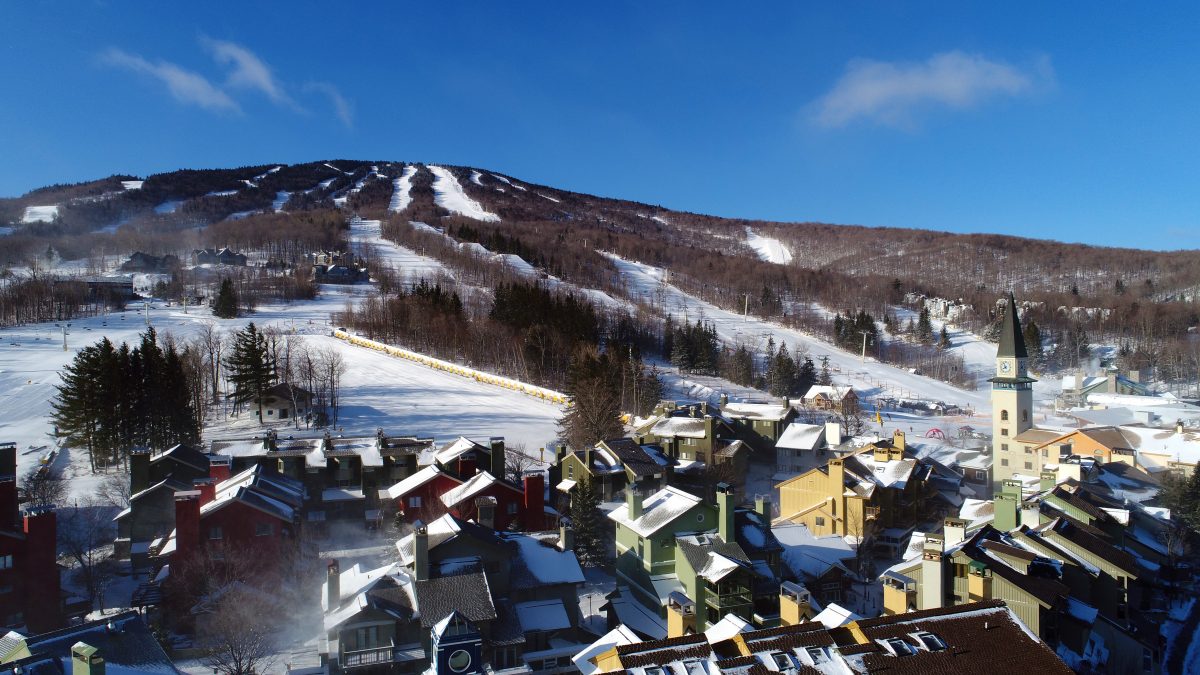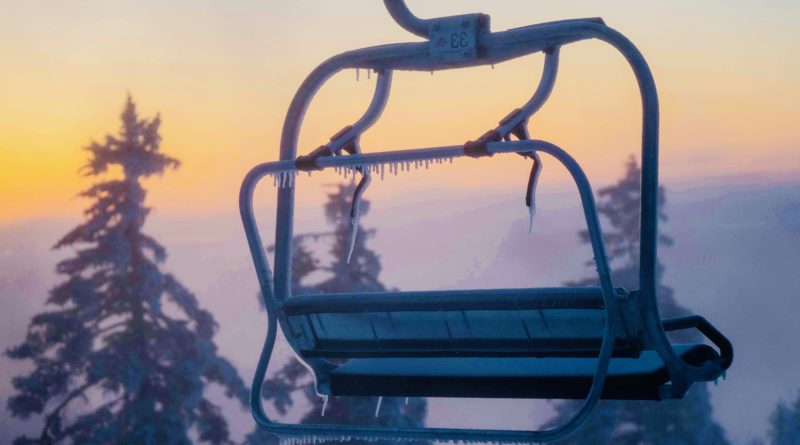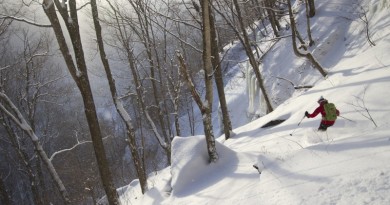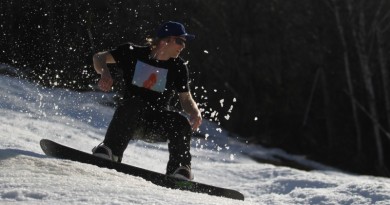Who Made The Decisions to Close?
On St. Patrick’s Day and the day after, the bullwheels were turning at a number of ski areas in New Hampshire.
On Saturday, March 15, both Vail Resorts and Alterra Mountain Company had shut down their ski areas across North America. Smuggler’s Notch was the last Vermont alpine ski area to close, on March 16. And Governor Scott had announced the closure of all Vermont bars and restaurants (with the exception of take out) on Monday evening, March 16. Loon Mountain and several other New Hampshire ski areas had also closed.

New Hampshire’s Conundrum
But on Tuesday, March 17 Waterville Valley Resort was promoting St. Patrick’s Day with $17 lift ticket deals. State-owned Cannon Mountain was operating on a limited basis with its tram closed and its food court offering take out only. A notice posted on their website stated “Under the directive of Governor Sununu, Cannon Mountain is to remain open until further notice, but with sharply curtailed services in order to reduce guest/guest and staff/guest interaction. Thanks for your patience and understanding as we work hard to provide you with skiing services while trying to meet both the Governor’s directives and CDC guidelines.”
What might have been lost on some is that New Hampshire Governor Chris Sununu is the former CEO of Waterville Valley. His family is the majority owner of Waterville Valley Resort and owns most of the developable land surrounding it. Oddly, that same notice did not appear on Waterville Valley Resort’s website, though a notice did appear that the base lodge and some lifts and operations are closed. Hotels and condominiums were still open for business.
Then, around 3:45 on Wednesday, March 18, Gov. Sununu posted this on Cannon’s website: “It has become clear today that large amounts of public congregation is occurring at Cannon Mountain. With the weekend quickly approaching, I have instructed Cannon management to cease operations by end of business today.” It was expected the three other New Hampshire ski resorts that remained open would close as well.
Later on the afternoon of March 18, Waterville Valley did close, acknowledging that they had been meeting all CDC recommendations yet “our continuing operations have been met with outcry by many who choose to misrepresent our efforts and have created an environment that has incited people to act irresponsibly to the point of becoming abusive and threatening to our staff.”
While ski areas such as Berkshire East made the decision early to close and did so independently of government actions, local governments have played a role in when and how ski areas closed.
Colorado’s Political Clout
While many lauded the decision made by ski areas — including the decisions by Killington/Pico, Vail Resorts and Alterra Mountain Company to shut down their ski area operations on March 15 across North America—for resorts in Colorado it was not a choice that was entirely theirs.
On Saturday night, March 14, Colorado Governor Jared Polis issued an executive order requiring all Colorado ski resorts to close for one week, starting the next day. The announcement came just hours after operators across the state preemptively said they were shutting down in response to the new coronavirus.
In a statement released Saturday night, the governor’s office said, “The Governor spent Saturday on the phone with resort community county commissioners, community public health officials, their community emergency operations command and several mountain hospitals and what became clear from those conversations was that given the conditions on the ground and the rapid spread of the virus, the time to act was now.”

According to The Aspen Times, “The order forced [Aspen] Skico to reverse the position laid out Friday by President and CEO Mike Kaplan. He said the company had considered all moral, legal and business issues and decided to keep its ski areas open while taking precautions to prevent the spread of the coronavirus.” Aspen is affiliated with Alterra Mountain Company. On Saturday, Alterra announced it would close all its mountain ski resorts indefinitely for the season. Vail Resorts, following the Governor’s orders, said it would close operations across North America, for one week.
In Aspen, a group of 10 Australians have been presumed to have the virus, and 25 others are being tested, the Aspen Times reports. Local health officials have said the virus has now hit “community transmission” meaning that it is now likely being spread by local residents, as well. The Summit County Daily also reports that some of those quarantined Australians continued to ski.
Colorado’s first recorded case of COVID-19 came from a skier. A California man in his 30s flew to Denver on February 29, felt fine and rented a car and drove to Keystone, then to Vail. By March 4, he had been checked into a hospital in Frisco and tests confirmed he had the novel coronavirus.
Vermont Ski Areas Respond
Middlebury College Snow Bowl, owned and operated by Middlebury College, announced it’s closure on March 12. For Jay Peak and Burke Mountain Resort whose primary customer base is north of the U.S. border, the decision by the Quebec and Ontario officials to limit entry to the U.S. prompted those mountains to announce their closure on Friday, March 13. “Given that we were about to welcome thousands of Ontario guests onto our campus….saying we are disappointed feels like the understatement of the century,” wrote general manager Steve Wright in the release announcing the ski area’s season closure.
Since then, all Vermont ski areas have shut down for the season. The last Vermont ski area to close was Smuggler’s Notch which shut down operations on Monday, March 16, following Governor Phil Scott’s mandate to cancel all gatherings of more than 50 people. Cross-country ski areas around the state, including the Craftsbury Outdoor Center and Trapp Family Lodge, have continued to groom and allow skiers to use their trails.
After watching COVID-19 sweep across the world, essentially shutting down China, then Italy now France and Spain, it seemed inevitable the U.S. would see big impacts and that ski resorts, at some point, would have to close.
That decision was not an easy one. On the one hand, skiing is one of the more inherently safe sports: it’s outdoors, people wear gloves, goggles and face masks. On the other, it masses people together in lift lines, on lifts and in base lodge restaurants and bathrooms—this, at a time when social distancing is being recommended to all as the best way to slow the spread.
While there certainly were financial considerations for the resorts, the pandemic is coming at a time when most ski areas have made the bulk of their money for the season. Few day tickets get sold in March and April and with food and beverage operations being shut down, there was little revenue to be had.
Yet the impact to local communities could be big. On Friday, March 13, the day before Alterra announced Sugarbush would close, Sugarbush president and former owner Win Smith posted this: “Personally, Lili and I, along with our children and grandchildren, plan to continue skiing and enjoying our wide-open spaces, fresh mountain air and thousands of acres of wilderness here in the Mad River Valley. We’ll also continue enjoying après and dining in our various establishments here at Sugarbush and throughout the Mad River Valley while making sure to wash our hands more frequently. And, of course, if any of us are not feeling well, we will stay home.”
Stowe’s parking lots, bars, hotels, and restaurants were filled with people from out of state, most coming from Massachusetts, New York or Connecticut–all states that have seen more a hundred or more confirmed cases. “We’re here because school is closed at home and we figured we might as well go skiing,” was the common answer to the question of why a family was skiing on a Thursday.
Vail Resorts has assured employees that they will be paid for the week of March 15-22 but not to report for work. At Jay Peak, employees who relied on employee housing will have their rent forgiven during the time of shut down. In addition, the resort is working with employees to file for unemployment and has offered to make up the difference in their compensation to “make them whole.”
For resorts such as Killington, where the town’s population hovers around 700 and spring skiers and events such as the Bear Mountain Mogul Challenge help keep bars and restaurants open through April, the impact will be even greater.
The good news? Nordic ski areas around the New England are still in operation. And there is time for the pandemic to calm before the next season starts: mountain biking.





Pingback: Closing Dates for Vermont's Ski Mountains – VT SKI + RIDE